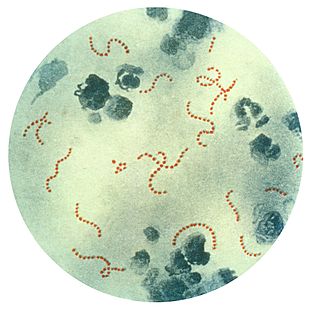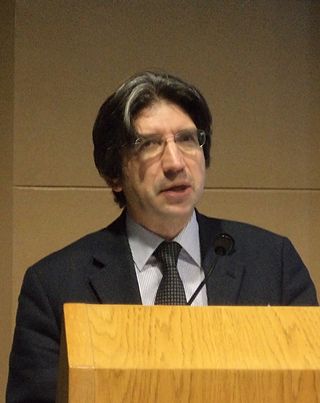Related Research Articles

Tourette syndrome or Tourette's syndrome is a common neurodevelopmental disorder that begins in childhood or adolescence. It is characterized by multiple movement (motor) tics and at least one vocal (phonic) tic. Common tics are blinking,coughing,throat clearing,sniffing,and facial movements. These are typically preceded by an unwanted urge or sensation in the affected muscles known as a premonitory urge,can sometimes be suppressed temporarily,and characteristically change in location,strength,and frequency. Tourette's is at the more severe end of a spectrum of tic disorders. The tics often go unnoticed by casual observers.

A tic is a sudden and repetitive motor movement or vocalization that is not rhythmic and involves discrete muscle groups. It is typically brief and may resemble a normal behavioral characteristic or gesture.
Sensory overload occurs when one or more of the body's senses experiences over-stimulation from the environment.

Pediatric autoimmune neuropsychiatric disorders associated with streptococcal infections (PANDAS) is a controversial hypothetical diagnosis for a subset of children with rapid onset of obsessive-compulsive disorder (OCD) or tic disorders. Symptoms are proposed to be caused by group A streptococcal (GAS),and more specifically,group A beta-hemolytic streptococcal (GABHS) infections. OCD and tic disorders are hypothesized to arise in a subset of children as a result of a post-streptococcal autoimmune process. The proposed link between infection and these disorders is that an autoimmune reaction to infection produces antibodies that interfere with basal ganglia function,causing symptom exacerbations,and this autoimmune response results in a broad range of neuropsychiatric symptoms.
Causes and origins of Tourette syndrome have not been fully elucidated. Tourette syndrome is an inherited neurodevelopmental disorder that begins in childhood or adolescence,characterized by the presence of multiple motor tics and at least one phonic tic,which characteristically wax and wane. Tourette's syndrome occurs along a spectrum of tic disorders,which includes transient tics and chronic tics.
Sensory phenomena are general feelings,urges or bodily sensations. They are present in many conditions including autism spectrum disorders,epilepsy,neuropathy,obsessive–compulsive disorder,pain conditions,tardive syndromes,and tic disorders.

Dan Joseph Stein is a South African psychiatrist who is a professor and Chair of the Dept of Psychiatry and Mental Health at the University of Cape Town,and Director of the South African MRC Unit on Risk &Resilience in Mental Disorders. Stein was the Director of UCT's early Brain and Behaviour Initiative,and was the inaugural Scientific Director of UCT's later Neuroscience Institute. He has also been a visiting professor at Mount Sinai School of Medicine in the United States,and at Aarhus University in Denmark.
Habit reversal training (HRT) is a "multicomponent behavioral treatment package originally developed to address a wide variety of repetitive behavior disorders".
The obsessive–compulsive spectrum is a model of medical classification where various psychiatric,neurological and/or medical conditions are described as existing on a spectrum of conditions related to obsessive–compulsive disorder (OCD). "The disorders are thought to lie on a spectrum from impulsive to compulsive where impulsivity is said to persist due to deficits in the ability to inhibit repetitive behavior with known negative consequences,while compulsivity persists as a consequence of deficits in recognizing completion of tasks." OCD is a mental disorder characterized by obsessions and/or compulsions. An obsession is defined as "a recurring thought,image,or urge that the individual cannot control". Compulsion can be described as a "ritualistic behavior that the person feels compelled to perform". The model suggests that many conditions overlap with OCD in symptomatic profile,demographics,family history,neurobiology,comorbidity,clinical course and response to various pharmacotherapies. Conditions described as being on the spectrum are sometimes referred to as obsessive–compulsive spectrum disorders.

Jay Tischfield is MacMillan Distinguished Professor and the Founding Chair of the Department of Genetics at Rutgers University. He is also Professor of Pediatrics and Psychiatry at Rutgers. He is currently Director of the Human Genetics Institute of New Jersey.

Obsessive–compulsive disorder (OCD) is a mental and behavioral disorder in which an individual has intrusive thoughts and feels the need to perform certain routines (compulsions) repeatedly to relieve the distress caused by the obsession,to the extent where it impairs general function.
Clinical neuroscience is a branch of neuroscience that focuses on the scientific study of fundamental mechanisms that underlie diseases and disorders of the brain and central nervous system. It seeks to develop new ways of conceptualizing and diagnosing such disorders and ultimately of developing novel treatments.
The cause of obsessive–compulsive disorder is understood mainly through identifying biological risk factors that lead to obsessive–compulsive disorder (OCD) symptomology. The leading hypotheses propose the involvement of the orbitofrontal cortex,basal ganglia,and/or the limbic system,with discoveries being made in the fields of neuroanatomy,neurochemistry,neuroimmunology,neurogenetics,and neuroethology.
James Frederick Leckman is an American child psychiatrist and psychoanalyst and the Neison Harris Professor of Child Psychiatry,Psychiatry,Psychology and Pediatrics at the Yale School of Medicine,recognized for his research in Tourette syndrome (TS) and obsessive–compulsive disorder (OCD).
Euripedes Constantino Miguel Filho is a Brazilian psychiatrist. He is a graduate of the Faculdade de Medicina da Universidade de São Paulo. He currently holds the title of Full Professor and is the Vice-Head of the FMUSP Department of Psychiatry. He is also an Adjunct Associate Professor at Duke University and at Yale University,as well as being a Research Consultant for Harvard University School of Medicine Massachusetts General Hospital. Miguel has authored or co-authored more than 150 articles published in journals indexed for the major international databases. Since 2004,he has coordinated the Consórcio Brasileiro de Pesquisa dos Transtornos do Espectro Obsessivo-Compulsivo. He is a researcher for the Fundação de Amparo àPesquisa do Estado de São Paulo and is the recipient of a 1B Research Productivity Grant from the Brazilian Conselho Nacional de Desenvolvimento Científico e Tecnológico. He is also the Director of the multicenter Instituto Nacional de Psiquiatria do Desenvolvimento para Infância e Adolescência,which was established under the auspices of the Institutos Nacionais de Ciência e Tecnologia. In the area of obsessive-compulsive disorder (OCD),he is coordinating his third FAPESP-sponsored Program Grant,which is focused on the investigation of neural circuits and biomarkers involved in OCD through the study of behavioral paradigms of fear and anxiety.

Wayne Goodman is an American psychiatrist and researcher who specializes in Obsessive-Compulsive Disorder (OCD). He is the principal developer,along with his colleagues,of the Yale-Brown Obsessive Compulsive Scale (Y-BOCS).
Jonathan Stuart Abramowitz is an American clinical psychologist and Professor in the Department of Psychology and Neuroscience at the University of North Carolina at Chapel Hill (UNC-CH). He is an expert on obsessive-compulsive disorder (OCD) and anxiety disorders whose work is highly cited. He maintains a research lab and currently serves as the Director of the UNC-CH Clinical Psychology PhD Program. Abramowitz approaches the understanding and treatment of psychological problems from a cognitive-behavioral perspective.
Ulisa Diane Buckingham is an African-American psychiatrist known for her development of culturally sensitive diagnosis and treatment of mental illness in children and adolescents.
John Piacentini,PhD,ABPP,is an American clinical child and adolescent psychologist,and professor of psychiatry and biobehavioral sciences at the David Geffen School of Medicine at UCLA in Los Angeles,California. He is the director of the Center for Child Anxiety,Resilience,Education and Support (CARES),and the Child OCD,Anxiety and Tic Disorders Program at UCLA's Semel Institute for Neuroscience and Human Behavior.

Carolyn I. Rodriguez is a Puerto Rican psychiatrist,neuroscientist,and clinical researcher developing treatments for obsessive compulsive disorder as well as mapping circuit dysfunction in the human brain. Rodriguez holds appointments in both clinical and academic departments at Stanford University. Rodriguez is a Clinical Lab Director at the Stanford Center for Cognitive and Neurobiological Imaging,an associate professor and Associate Chair of Psychiatry and Behavioral Sciences,and a Director of several specialized translational research programs.
References
- ↑ "Pittenger, Christopher, 1972-". VIAF. Retrieved June 24, 2021.
- ↑ "Christopher Pittenger". The Spokesman-Review. January 6, 1985. Retrieved June 26, 2021– via newspapers.com.
- ↑ "4-student Md. team is 2nd in contest". The Baltimore Sun. May 18, 1986. Retrieved June 26, 2021– via newspapers.com.
- 1 2 3 "Christopher Pittenger MD, PhD, FAPA, FANA". Yale University. Retrieved June 26, 2021.
- 1 2 "Scholar: Christopher Pittenger". Yale University. Retrieved June 26, 2021.
- ↑ "Past Scholars Reflect on Being a Scholar". Yale University. March 29, 2019. Retrieved June 26, 2020.
- ↑ "Society of Neuroscience honors two Yale affiliates for their research". Yale University. October 21, 2009. Retrieved June 26, 2021.
- ↑ "2011 Pilot Awardees". Yale University. 2011. Retrieved June 26, 2021.
- ↑ "Department of Psychiatry announces promotions, new faculty appointments". Yale University. December 10, 2013. Retrieved June 26, 2021.
- ↑ Hathaway, Bill (January 9, 2014). "Yale researchers find rare genetic cause of Tourette syndrome". Yale University. Retrieved June 26, 2021.
- ↑ "Pittenger awarded 2015 ACNP Eva King Killam Research Award". Yale University. December 7, 2015. Retrieved June 26, 2021.
- ↑ "Christopher Pittenger Elected as Vice Chair of Faculty Advisory Council". Yale University. April 24, 2018. Retrieved June 26, 2021.
- ↑ "Pittenger appointed to new position of Assistant Chair for Translational Research". Yale University. August 20, 2018. Retrieved June 26, 2021.
- ↑ "Yale Psychiatry Names New Research Leaders at Connecticut Mental Health Center". Yale University. January 20, 2021. Retrieved June 26, 2021.
- ↑ Hathaway, Bill (June 16, 2020). "Yale scientists propose explanation for baffling form of childhood OCD". Yale University. Retrieved June 26, 2021.
- ↑ "AAP and the ASCI Elect New Members from the School of Medicine Faculty". Yale University. April 9, 2021. Retrieved June 26, 2021.
- ↑ "Pittenger edits new book on obsessive-compulsive disorder". Yale University. September 18, 2017. Retrieved June 26, 2021.